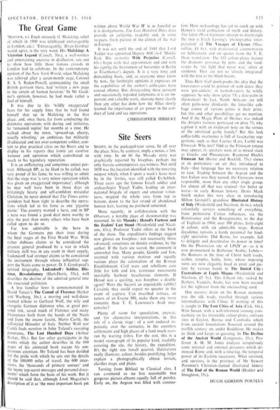The Great Game
`MAFrick, v.i. Exult riotously (f. Mafeking, relief of which in 1900 was celebrated extravagantly in London, etc.).' 'Extravagantly,' Brian Gardner would agree, is the very word. His Mafeking: A Victorian Legend (Cassell, 30s.), a well-written and entertaining exercise in disillusion, sets out to show how little those riotous crowds in London had to celebrate. In the contemporary opinion of the New York World, when Mafeking was relieved after a seven-month siege. Colonel R. S. S. Baden-Powell, commanding the small British garrison there, had 'written a new page in the annals of human heroism.' In Mr Gard- ner's opinion, however, he had made rather a fool of himself.
It was due to his 'wildly exaggerated' fears for his supply lines that he had found himself shut up in Mafeking in the first place; and, once there, far from conducting the defensive operations with daring and initiative, he 'remained supine' for months at a time. He walked about the town, 'spruced-up, cheery, usually whistling,' an ambitious but militarily ill-educated and not over-competent soldier, con- tent to play practical jokes on the Boers and to display in his reports that ironic yet carefree humour and optimism which contributed so much to his legendary reputation.
It is an unflattering and sometimes unjust por- trait. Although BP, as he liked to be called, was very proud of his fame, he was willing to admit that the siege was 'a very minor operation which was given an exaggerated importance'; although he may well have been in those days an irritatingly hearty and self-confident muscular Christian, he never denied that The Times corre- spondent had been right to describe the opera- tions which led to his fame as one `gigantic picnic.' The country wanted a hero, and in BP a hero was found a good deal more worthy to play the part than many others who have been called upon to do so.
Far less admirable is the hero in whom the Germans put their trust during the final stages of the First World War. With rather dubious claims to be considered the greatest general produced by a war in which military skill was in any event in short supply, Ludendorff had stronger claims to be considered the instrument through whose influential sup- port the Nazis came to power. D. J. Goodspeed's spirited biography, Ludendorff : Soldier, Dic- tator, Revolutionary (Hart-Davis, 55s.), well describes the decline of the admired general into the execrated politician.
A less familiar hero is commemorated in David Tutaev's The Consul of Florence (Seeker and Warburg, 36s.), a moving and well-docu- mented tribute to Gerhard Wolf, the wily and energetic German diplomat who, at great per- sonal risk, saved much of Florence and many Florentines both from the hands of the Nazis and from the insane fascist, Mario Carla, the self-styled Himmler of Italy. Neither Wolf nor Carita finds mention in John Toland's sweeping panorama, The Last Hundred Days (Arthur Barker, 50s.). But few other participants in the events which the author describes in the 600 pages of his animated book escape his om- nivorous attention. Mr Toland has been derided for the pride with which he sets out the details of the 100,000 miles of travel, the 600 inter- views, the `thousands of primary sources' and the 'many top-secret messages and personal docu- ments' which form the basis of his work. But it should be said that, although Look Magazine's description of it as 'the most important book yet
written about World War II' is as fanciful as it is disingenuous, The Last Hundred Days does provide an authentic, readable and, in some respects, fresh picture of the climax of the war in Europe.
It was not until the end of 1940 that Lord Tedder was appointed Deputy AOC-in-C Middle East. His memoirs With Prejudice (Cassell, 63s.) begin with that appointment and end with his signing the Instrument of Surrender in Berlin as Eisenhower's deputy. It is a very long and demanding book, and, as everyone must know by now, the forthright opinions it expresses on the capabilities of the author's colleagues have caused offence. But, disregarding these acescent and occasionally lopsided judgments, it is an im- portant and valuable work, showing more clearly than any other has done how the Allies slowly learned the importance of air power in the con- duct of land and sea operations.
CHRISTOPHER HIBBERT






























 Previous page
Previous page